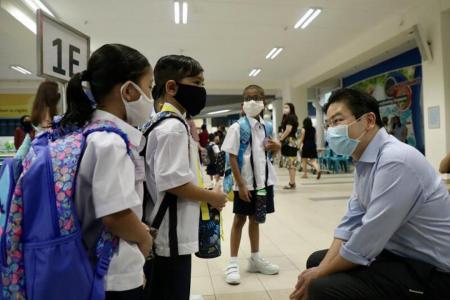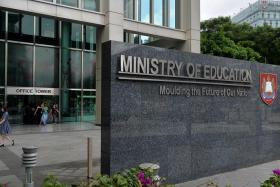Raising Phase 2C spots of P1 intake ‘will throw up winners and losers’
More places for those without connections to school in P1 intake may reduce slots for others, says expert
Increasing the intake for Phase 2C of the yearly Primary 1 registration exercise would be a double-edged sword, said parents, depending on which stage they are hoping to apply at.
Madam Sia Yiting, 35, a mother of two, said: "Whether or not it's a good move depends on which other phase those additional slots are going to come from."
The insurance agent believes that opening up more Phase 2C places is fairer for the average person, but would prefer that this does not mean a cut in alumni slots.
These issues are foremost on parents' minds amid a review by the Ministry of Education (MOE) to see how it can set aside more places under Phase 2C, which is for those who do not enjoy any priority admission, and is based on home-to-school distance.
Any changes will take effect starting with the cohort of children registering next year to enter Primary 1 in 2023.
Madam Sia, who has two sons aged four and six, now faces the decision of whether to send them to her alma mater, Poi Ching School, in Tampines, or apply for a school nearer to her home in Sengkang.
"It would be difficult to forgo a guaranteed place in a school through my alumni connection when nearby ones are often also oversubscribed in areas with many young families and may end up in a ballot as well," she said.
Since 2014, each primary school has set aside 40 places for children who have no prior connection with the school - 20 in Phase 2B and 20 in Phase 2C.
Phase 2B is for children whose parents are school volunteers or active community leaders, or have church or clan association ties.
Last year, 99 schools went to a ballot in Phase 2C, compared with 81 in 2019.
Education Minister Lawrence Wong, who announced the review in Parliament recently, said schools must be open to students from all backgrounds. MOE will need to balance competing demands, such as home-to-school proximity and giving some priority to certain groups, like alumni in Phase 2A.
Ms Jeanette Huang, 35, who has two daughters in Kindergarten 2 and Nursery 2, said: "It's very difficult and anxiety-inducing now to try to get places in schools in locations where there are a lot of young parents.
"Currently, balloting occurs even for non-brand-name schools in Phase 2C," said the financial adviser, who is for allocating more spots to Phase 2C.
National Institute of Education don Jason Tan said primary school admission is complex as "it tries to juggle so many different priorities at the same time".
"Different criteria also have varying levels of importance."
National University of Singapore senior economics lecturer Kelvin Seah said that increasing Phase 2C spots will "throw up winners and losers".
"The winners would be the unaffiliated who would otherwise have not got into their school of choice. The losers are the alumni, who now face a lower likelihood of getting into their school of choice," he said.
Despite the MOE's reassurance that every school is a good school, not all are convinced.
Associate Professor Tan said: "Some parents have concerns about schools' reputation, some feel they need to get their child into a primary school that is affiliated with a good secondary school."
Parents also deem schools with the Gifted Education Programme and Special Assistance Plan as more prestigious, he said.
In essence, society's definition of "a good school" may not have changed much, he said.
"Parents still think a good school is one that offers their child the best prospects of doing well in life, by granting him better access to post-secondary education options."
Dr Seah said: "Primary schools, especially those which are the highest academically performing, need to remain accessible so that income and social inequality in society does not come to perpetuate.
"On average, I suspect alumni of the most coveted schools here also tend to be more wealthy."
Prof Tan said: "There is growing evidence that schools are critical in the formation of social networks that persist into adulthood, hence the concern that children without links to certain schools might lose out."
Get The New Paper on your phone with the free TNP app. Download from the Apple App Store or Google Play Store now



